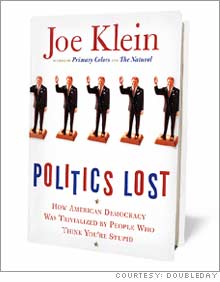|
First, we kill all the consultants
Joe Klein indicts an industry - the hired guns of politics - for the murder of our public life. And he knows where the bodies are buried.
(FORTUNE Magazine) - If Joe Klein's new book were just another screed about how hired-gun consultants have destroyed politics, I wouldn't be interested. I'm generally fed up with books that are generally fed up. But it's not. It's a book about how consultants have destroyed politics, written by someone who loves consultants, someone who secretly wants to be a consultant (or did until his writing made him as rich as one), someone who has been hanging out with the hired guns for the past eight presidential cycles or so, drinking and arguing policy and writing stories that set out to prove he's smarter than they are, and often succeeding.
Klein, now a political columnist for Time, has a gift for passionate, jilted-lover prose. He wrote his best stuff about Bill Clinton after he fell out of love with Clinton. So when he lifts his bow toward the consultants, I want to see those arrows fly. In Politics Lost (Doubleday), Klein argues that election professionals have made our politics "cautious, cynical, mechanistic, and bland" because they are "literal reactionaries - they react to the results of their polling and focus groups, they fear anything they haven't tested." They fed Al Gore a diet of phony, market-researched language in 2000 and persuaded him to ignore the environment - his signature, passionate issue - because they thought it wouldn't win him electoral votes. (They didn't consider that it might win him the election by letting him be real.) They fed the same denatured swill to John Kerry in 2004 and persuaded him to downplay the Iraq war, and even the torture at Abu Ghraib. Klein inspires jealousy among his fellow scribes - he writes better, thinks better, than most. He was unmasked as the anonymous bestselling author of "Primary Colors" in 1996, after denying it long and loud to friends, colleagues, and the world. (Disclosure: I was one of those colleagues. I worked with him at New York magazine and later at Time. I forgave him; others did not.) Klein knows that a candidate with guts and conviction can set his own course, and he celebrates the mavericks, going back to Bobby Kennedy, who have bared their souls in spontaneous moments along the trail. These flashes of humanity may be good for politics, but they're great for Klein and his readers - he's always in search of the crystalline moment for his next story, the perfect metaphor that captures country and candidate in their symbiotic dance. But authenticity isn't always a winning ticket. In the 2000 Republican primary, Senator John McCain was an honest loser, too rebellious for the GOP room. Right now McCain is being joyously inauthentic, making nice to folks like Jerry Falwell in hopes he can squeak to victory in the 2008 primary. Being sincerely phony is McCain's only chance to win the nomination.
That's the sort of irony Klein has always savored. It appalls him, but he can't help but love the game. |
|

